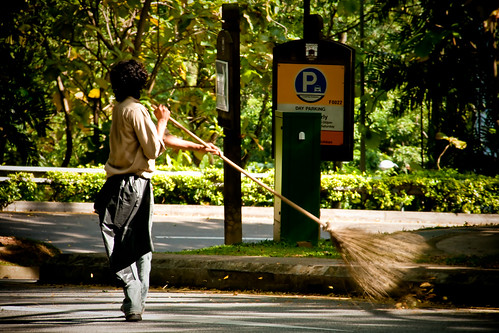The Sacred Paschal Triduum
Thursday of the Lord's Supper (Maundy Thursday) (B)
Between Passion & Action
Thursday of the Lord's Supper (Maundy Thursday) (B)
Between Passion & Action
Picture: cc GokuPhoto
Sisters and brothers, I’m a little embarrassed to say this. But there was a time when I thought that the world was made up of basically two types of people. The hardworking people, and the lazy people. The people who made things happen, and those who simply let things happen to them. The people who strove to achieve success, and those who were content simply to remain failures. I’m not sure where I got this idea from. Perhaps it has something to do with growing up here in Singapore. Where adults would occasionally draw a child’s attention to someone cleaning the streets, but only to to say: You see that person over there? You better study hard, or you’ll end up like that. Like I said, two types of people. The active people, and the passive people. And no prizes for guessing which type I wanted to be.
Active good. Passive bad. Seems like a reasonable idea. Until we allow ourselves to pay close attention to the Mystery we are celebrating today. Today, we celebrate Palm Sunday of the Lord’s Passion. We celebrate! We glory in the Lord’s Passion! And we should not be mistaken. Here, the word passion does not mean strong emotion. What it does mean is suffering. Here, the word passion has a meaning that is the exact opposite of the word action. Here, to undergo passion is to suffer. To passively allow others to inflict pain on oneself. This is what Jesus undergoes.
In our readings today, Jesus remains shockingly passive. As we heard in the first reading: I made no resistance, neither did I turn away. I offered my back to those who struck me, my cheeks to those who tore at my beard; I did not cover my face against insult and spittle. Shockingly passive. In contrast, it is the enemies of Jesus who appear the most active. The chief priests and the scribes and the elders. These go to great lengths to have Jesus arrested and tortured and killed. And, of course, it is through the actions of the traitor Judas Iscariot, that Jesus is handed over to his enemies.
Should I then say that I was wrong? That it is not active good and passive bad, but the opposite? Passive good and active bad. Perhaps. But we have to be careful what we mean by passive. For, in today’s gospel, Jesus is not the only one who appears to do nothing. We find others as well. But not in a good sense. Consider Pontius Pilate, for example. He knew very well that Jesus was innocent. But he did nothing to help him. He sentenced Jesus to be first scourged and then crucified. And what about the other disciples of Jesus? They who received the Lord’s teaching, and witnessed his miracles. They who ate at his table, and professed their undying loyalty to him. When the crucial moment came, all these friends of Jesus deserted him. Clearly, this is a very different kind of passivity from that of the Lord.
We also have to be careful about what we mean by active. For it is not only the enemies of Jesus who appear active. In Mark’s gospel, which we read just now, we find the moving story of the woman with the alabaster jar of very costly ointment. Disregarding the snide remarks of those around her, this woman courageously anointed Jesus’ body for burial. She acted. But her action is of a very different kind from those of the Lord’s enemies.
So what is the difference, sisters and brothers? What is the difference between the passivity of Jesus, and that of Pilate and the disciples? What is the difference between the activity of the Lord’s enemies and that of the woman with the ointment? The answer, I believe, is to be found in the second reading, where we’re told that Jesus Christ’s state was divine, yet he did not cling to his equality with God but emptied himself to assume the condition of a slave. What is so praiseworthy, what is so glorious, about Jesus’ Passion, is not so much that he simply did nothing–as Pilate and the disciples did nothing–but that he emptied himself for the love of God and of humanity. He emptied himself. Even to accepting death on a cross. And didn’t the woman with the ointment do something similar? Her action was an emptying. Not just of the precious contents of her jar. But also of her very self. She acted in the face of ridicule. She acted, even when it was inconvenient. She acted for the love of Christ.
On the contrary, the passivity of Pilate and the disciples, as well as the activity of the Lord’s enemies, were geared not towards self-emptying, but self-preservation. Pilate did nothing because he wished to keep the peace, and to safeguard his job. The disciples ran away because they feared for their lives. The enemies of Jesus conspired against him because he threatened their religious authority. Active or passive, each of these people were motivated by the need for self-preservation.
Should we say then that the world is made up of two types of people: the self-emptying and the self-preserving? I don’t think so. For we know that the disciples, at least, came to regret their inaction. After Pentecost, they received courage to empty themselves, as their Master had done before them. People change. Perhaps what we can say, then, is not that the world is made up of two different types of people, but rather of two contrasting attitudes. One of self-preservation. And the other of self-emptying. One of selfishness. And the other of love.
Sisters and brothers, which attitude do you find in yourself today?



